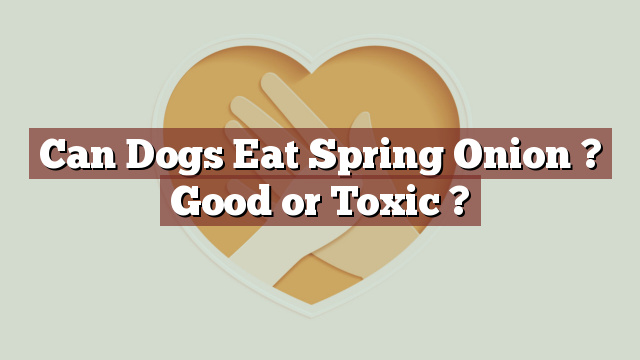Can Dogs Eat Spring Onion? Good or Toxic?
As responsible pet owners, it is crucial to be aware of what foods are safe for our furry companions. While some human foods can be a healthy addition to a dog’s diet, others can pose serious health risks. One such food that often raises questions is spring onion. In this article, we will explore whether dogs can eat spring onions or if they should be avoided.
Nutritional Value of Spring Onions: Vitamins, Minerals, and More
Spring onions, also known as green onions or scallions, are a popular ingredient in many culinary dishes. They are a member of the Allium family, which includes other vegetables like onions and garlic. Spring onions are low in calories but rich in essential vitamins and minerals. They contain vitamins A, C, and K, as well as calcium, potassium, and fiber.
Can Dogs Eat Spring Onion? Understanding Safety for Your Pet
Can dogs eat spring onion? The answer is a resounding no. While spring onions may provide nutritional benefits for humans, they can be toxic to dogs. Spring onions, particularly the bulbs and stems, contain a substance called N-propyl disulfide, which can cause severe damage to a dog’s red blood cells if ingested.
Even small amounts of spring onion can be harmful to dogs, leading to symptoms such as vomiting, diarrhea, abdominal pain, weakness, and pale gums. In severe cases, it can even result in a condition known as hemolytic anemia, which can be life-threatening if not treated promptly.
Potential Risks and Benefits of Feeding Spring Onions to Dogs
Feeding spring onions to your dog can have serious consequences. The toxic compounds present in spring onions can lead to oxidative damage to the red blood cells, causing them to rupture and reduce their ability to carry oxygen. This can result in anemia and other related complications.
On the other hand, there are no significant health benefits that spring onions offer specifically to dogs. It is important to note that dogs have different digestive systems and metabolisms than humans, and not all foods that are safe for us are safe for them.
My Dog Ate Spring Onion, Now What? Immediate Steps to Take
If you suspect that your dog has consumed spring onion, it is crucial to act quickly. Immediate veterinary attention is necessary, especially if your dog has ingested a significant amount. Contact your veterinarian and provide them with details of the incident, including the quantity of spring onion consumed and any observed symptoms.
In some cases, your veterinarian may induce vomiting or administer activated charcoal to prevent further absorption of toxins. The treatment plan will depend on the severity of the situation and the symptoms exhibited by your dog.
Conclusion: Spring Onions and Dogs – Weighing the Risks and Benefits
In conclusion, dogs should not eat spring onions due to their toxic nature. While spring onions can provide nutritional benefits to humans, they can cause serious harm to our canine companions. The presence of N-propyl disulfide in spring onions can lead to damage to red blood cells, resulting in various health issues.
As responsible pet owners, it is crucial to be knowledgeable about foods that are safe for our dogs. If in doubt, it is always best to consult with a veterinarian before introducing any new foods into your dog’s diet. Your veterinarian can provide expert advice and guidance tailored to your dog’s specific health needs, ensuring their well-being and happiness.
Thank you for investing your time in exploring [page_title] on Can-Eat.org. Our goal is to provide readers like you with thorough and reliable information about various dietary topics. Each article, including [page_title], stems from diligent research and a passion for understanding the nuances of our food choices. We believe that knowledge is a vital step towards making informed and healthy decisions. However, while "[page_title]" sheds light on its specific topic, it's crucial to remember that everyone's body reacts differently to foods and dietary changes. What might be beneficial for one person could have different effects on another. Before you consider integrating suggestions or insights from "[page_title]" into your diet, it's always wise to consult with a nutritionist or healthcare professional. Their specialized knowledge ensures that you're making choices best suited to your individual health needs. As you navigate [page_title], be mindful of potential allergies, intolerances, or unique dietary requirements you may have. No singular article can capture the vast diversity of human health, and individualized guidance is invaluable. The content provided in [page_title] serves as a general guide. It is not, by any means, a substitute for personalized medical or nutritional advice. Your health should always be the top priority, and professional guidance is the best path forward. In your journey towards a balanced and nutritious lifestyle, we hope that [page_title] serves as a helpful stepping stone. Remember, informed decisions lead to healthier outcomes. Thank you for trusting Can-Eat.org. Continue exploring, learning, and prioritizing your health. Cheers to a well-informed and healthier future!

